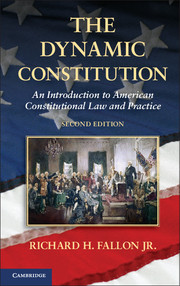Book contents
- Frontmatter
- Contents
- Preface to the Second Edition
- Preface to the First Edition
- Prologue: The Affordable Care Act and Other Vignettes
- Introduction
- Part I Individual Rights under the Constitution
- Part II The Constitutional Separation of Powers
- Part III Further Issues of Constitutional Structure and Individual Rights
- Appendix: The Constitution of the United States
- References
Prologue: The Affordable Care Act and Other Vignettes
Published online by Cambridge University Press: 05 May 2013
- Frontmatter
- Contents
- Preface to the Second Edition
- Preface to the First Edition
- Prologue: The Affordable Care Act and Other Vignettes
- Introduction
- Part I Individual Rights under the Constitution
- Part II The Constitutional Separation of Powers
- Part III Further Issues of Constitutional Structure and Individual Rights
- Appendix: The Constitution of the United States
- References
Summary
It is emphatically the province and duty of the judicial department to say what the law is. Those who apply the rule to particular cases, must of necessity expound and interpret that rule.
– Marbury v. Madison (1803)[W]hoever hath an absolute authority to interpret any written or spoken laws, it is he who is truly the lawgiver, to all intents and purposes, and not the person who first spoke or wrote them.
– Bishop Hoadly’s Sermon, preached before King George I of England, March 31, 1717On June 28, 2012, the fate of the Patient Protection and Affordable Care Act – or “Obamacare,” as many called it – hung in the balance. That statute, which aimed to guarantee health care to virtually all Americans, was the signature achievement of the Obama administration, enacted with great fanfare in 2010. On the night when the bill passed the House in final form, by a vote of 219–212, the President had delivered a short, triumphant speech to the American people, celebrating the accomplishment. Banner headlines appeared in newspapers the following day. Two years later, however, the nation braced for another cliffhanger vote on the Affordable Care Act (ACA), this time by the Supreme Court of the United States.
- Type
- Chapter
- Information
- The Dynamic ConstitutionAn Introduction to American Constitutional Law and Practice, pp. xix - xxxPublisher: Cambridge University PressPrint publication year: 2013



